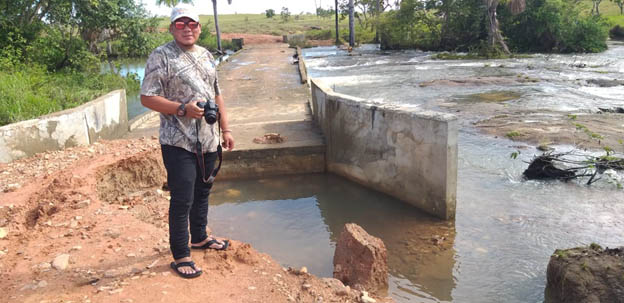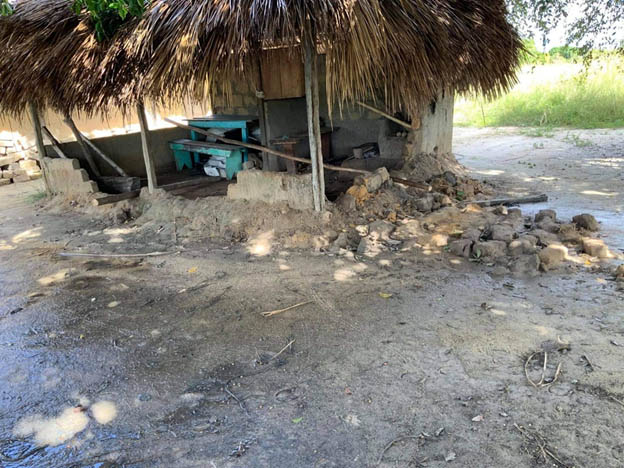Unrelenting rainfall and prior fragile defences against that eventuality have devastated the village of Karaudarnau and additional huge swathes of the south Rupununi, and village Toshao Apollo Isaacs has told the Stabroek Business that the community has been left needing an urgent response that will bring a measure of relief to residents of both Karaudarnau and other communities and, as well, fortify the affected communities for likely more rains ahead. This, he asserts in his correspondence, has not been forthcoming.

section of the access road to the village
In an assessment which strongly suggests that the affected community was largely unprepared for the eventuality, Isaacs also made an unveiled assertion that officialdom continues to demonstrate less than adequate concern for either better securing residents against the worst excesses of flooding or responding with the requisite alacrity to such emergencies.
Toshao Isaacs’ brief on the impact of several days of near countrywide rain on the south Rupununi sent to the Stabroek Business last Saturday provides graphic details of “immense” loss of cassava crops and damaged homes and also describes the entire flooding of “many farm areas,” a circumstance that has left communities that are dependent on farm produce for their livelihoods vulnerable. He has also reported the collapse of the walls of adobe houses in the community on account of the “consistent rains” a circumstance that would have severely compromised the living conditions of the affected residents.
Other challenges, including food and health-related ones have derived from the fact that the flooding has resulted in livestock becoming “sick and unhealthy,” the Toshao says. In other instances, he says, the volume of water on the land has hampered the efforts of the farmers to access their farms to undertake damage assessment. Up to the time of his report, Isaacs informed that directly “affected homes and persons included one hundred and twenty farmers and fifteen ranchers”. Ten houses had, up to that time, been damaged, apparently seriously. “There are still many active cases of COVID-19 in my village and some of those in home quarantine,” Isaacs added.
The situation, Isaacs says, has been made worse on account of the fact that “the main access road is badly damaged and some culverts are even blocked preventing water from flowing freely. The roads have all deteriorated since all of them are built and upgraded during the dry season,” the Toshao says. He attributes the erosion of the roads in some measure to the fact that “in most cases the Contractors are not au fait with the flooding that happens during the rainy season”, a circumstance that results in the construction of the roads taking no account of “the rainy season.”
Meanwhile, Isaacs said in his communication to the Stabroek Business that the incessant rains have meant that some rivers have become impassable, seriously hindering travel between Karaudarnau and Lethem. “We are hoping for the waters to recede soon enough so that persons can access the road to go to Lethem to have their essentials needs,” Isaacs told the Stabroek Business.
The Karaudarnau Toshao is concerned that help has been slow in reaching affected families with “a large number of people” not having received any flood relief up to last Saturday. “We are awaiting the CDC to make an assessment or at least visit our village,” Isaacs said in his written communication with the Stabroek Business. Up to last Saturday, according to Isaacs, the 120 affected farmers had only received, amongst them, 25 food hampers from the government, an amount which he noted “is insufficient at this time.” Meanwhile, according to Isaacs “the flood affectees did not get any medical relief neither has there been any assessment for the animals affected.” He said that the Village Council had intended “to help by way of donations to be distributed to those affected” including undertaking “self- help activities to rebuild some homes once the rains cease.”
Isaacs, meanwhile, penned that it is desirable that lessons be learnt from the current flooding experience including those that have to do with the need for villagers to ‘be advised on the proper building of their homes” in order to “secure themselves from future instances like these.” He is also recommending that initiatives be taken to ensure that “roads have proper drainage systems” and that ‘bridges be assessed and strengthened before the rainy season.” Isaacs also wants farmers and ranchers to be advised on ways to prepare for flooding in the future.








